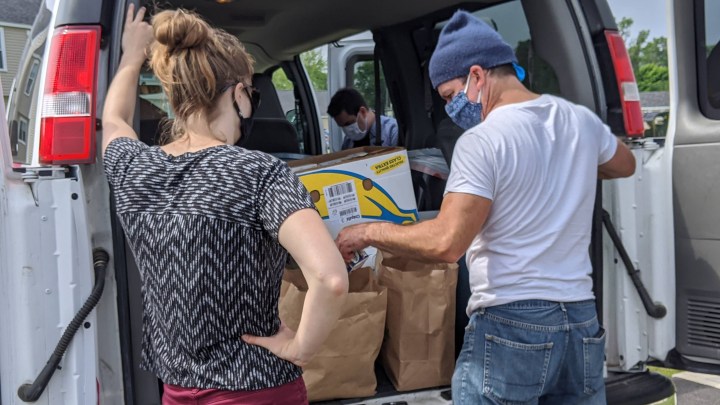
As colder months approach, Maine housing advocates seek new resources
As colder months approach, Maine housing advocates seek new resources

Becca Gildred unlocks the door to a tiny building in coastal Rockport, Maine. It’s traditionally been used by her agency — the Knox County Homeless Coalition — for meetings and classes. But today, there are cans stacked to the ceiling.
“Right now, it’s warehousing extra food, because of trying to meet the need, from day one, of COVID. We did not stop,” said Gildred, who is the organization’s director of development.
The agency serves about 400 people across three rural, coastal counties. Executive Director Stephanie Primm said its clients are often working families, people who can’t find an affordable place to live as local real estate prices have skyrocketed.
The pandemic has only made things harder. It has affected millions of workers across the country. Now, some benefits have started to shrink.
“When people were forced to stay home together, and there were already tenuous situations, we saw a lot of people getting kicked out of those situations,” Primm said.
In Maine, courts began to once again hear eviction cases at the beginning of August. So housing advocates are now trying to reimagine the state’s homeless resource system as they prepare for the wave of additional need.
And she says continued economic woes could leave many more people needing help. The federal government announced in September it was halting evictions through the end of the year for certain renters who can show they can’t afford rent because of the pandemic. But the Aspen Institute still estimates that more than 30 million could be at risk of eviction in the U.S.
“We’re anticipating a significant increase in need over the next six months,” Primm said.
In Maine, agencies have opened temporary shelters and rented out entire hotels to handle the need so far. And the state recently put aside $15 million to expand a relief program for certain people who can’t afford their rent because of the pandemic. It will provide $1,000 a month for up to three months.
For the long term, MaineHousing Director Daniel Brennan said he wants to rethink the state’s homeless services system — to build more affordable housing, plus smaller, scattered shelters across the state.
“Going back to a system where people are congregating tightly into a building for a short period of time and then back out onto the street, it doesn’t strike me that we should go back to that,” Brennan said.
But in the short term, advocates are trying to get people housed now to ensure they have a warm place to stay. That’s urgent heading into colder months, in a state known for its long, harsh winters.
There’s a lot happening in the world. Through it all, Marketplace is here for you.
You rely on Marketplace to break down the world’s events and tell you how it affects you in a fact-based, approachable way. We rely on your financial support to keep making that possible.
Your donation today powers the independent journalism that you rely on. For just $5/month, you can help sustain Marketplace so we can keep reporting on the things that matter to you.












